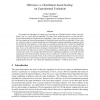Free Online Productivity Tools
i2Speak
i2Symbol
i2OCR
iTex2Img
iWeb2Print
iWeb2Shot
i2Type
iPdf2Split
iPdf2Merge
i2Bopomofo
i2Arabic
i2Style
i2Image
i2PDF
iLatex2Rtf
Sci2ools
127
Voted
ESA
2005
Springer
2005
Springer
Oblivious vs. Distribution-Based Sorting: An Experimental Evaluation
We compare two algorithms for sorting out-of-core data on a distributed-memory cluster. One algorithm, Csort, is a 3-pass oblivious algorithm. The other, Dsort, makes three passes over the data and is based on the paradigm of distribution-based algorithms. In the context of out-of-core sorting, this study is the first comparison between the paradigms of distribution-based and oblivious algorithms. Dsort avoids two of the four steps of a typical distribution-based algorithm by making simplifying assumptions about the distribution of the input keys. Csort makes no assumptions about the keys. Despite the simplifying assumptions, the I/O and communication patterns of Dsort depend heavily on the exact sequence of input keys. Csort, on the other hand, takes advantage of predetermined I/O and communication patterns, governed entirely by the input size in order to overlap computation, communication, and I/O. Experimental evidence shows that, even on inputs that followed Dsort’s simplifying...
| Added | 27 Jun 2010 |
| Updated | 27 Jun 2010 |
| Type | Conference |
| Year | 2005 |
| Where | ESA |
| Authors | Geeta Chaudhry, Thomas H. Cormen |
Comments (0)

